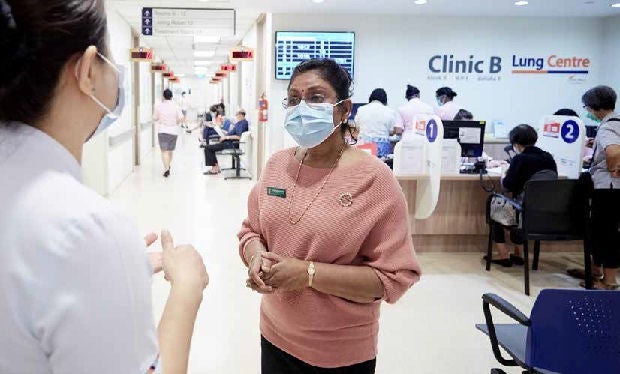
Senior Patient Experience Managers walk the hospital grounds every day to handle feedback before they escalate into official complaints.
Long waiting times and overly cold rooms are two of Singapore General Hospital (SGH) patients’ pet peeves. Although relatively minor and easily resolved, these simple concerns can escalate without a quick response.
To counter this, SGH adopted the Senior Patient Experience Network (SPEN) initiative in July 2018 to leverage the vast experience of former senior nurse managers, and their close working relationships with clinicians and other hospital professionals.
“If something troubles patients, we lend them a listening ear. Even if they seem happy or satisfied, we will engage them. Feedback helps us improve our hospital processes,” said Ms Quek Aik Huan, Senior Patient Experience Manager (SPEM), Office of Patient Experience (OPE), SGH.
Like the other eight SPEMs in the network, Ms Quek is a former senior nurse manager with some 50 years in the field. At retirement, these nurses were asked to be nurse manager mentors to younger colleagues. While training is still part of their job as SPEMs, their mission now is a bit different. They are based in various clinical areas, including the Department of Emergency Medicine (DEM), wards, and specialist outpatients clinics (SOCs) to make sure patients are comfortable and well; listen to their feedback to allay their concerns; and resolve problems quickly. For instance, following feedback about the cold at DEM, a blanket station was set up. Patients no longer have to ask and wait for a nurse to bring them a blanket. They can help themselves.
Every morning, the SPEMs discuss with their regular nursing teams the issues that require following up. Although SPEMs do not hold clinical roles, their nursing knowledge and experience are invaluable in dealing with medical- or nursing-related feedback. They also ease pressure on the medical team by helping to explain to patients scans or other procedures that they have been asked to undergo.
DEM SPEM Phuah Gaik Kheng helps the emergency services team to keep patients’ families informed. “P1 (critically ill) patients require resuscitation and other urgent care, but the medical team may not have the luxury of time to constantly update their families,” said Ms Phuah.
“Anyone would be anxious if his or her loved one is admitted and they do not get any news from the hospital,” she added.
The SPEMs are able to understand the anxiety and fear that patients and their families go through by putting themselves in their shoes. “I have learnt that the key to deal with unhappy patients is to hear them out, and be empathetic and respectful,” said Ms Jarojah Narayansamy, the SPEM for the SOCs.
While she is encouraged by praises and positive feedback, Ms Jarojah said she feels helpless when she is unable to help patients and their caregivers. Complex issues that the SPEMs cannot solve, such as requests for bill waivers or allegations against staff, are forwarded to the OPE feedback officers for investigation.

<<When SPEMs could not
visit patients in isolation, they
continued to engage them by
calling to find out their needs. This
group cannot have visitors and
can be overwhelmed by feelings of
loneliness, fear and anxiety.>>
| At the height of the COVID-19 pandemic, the SPEMs focused their attention on patients placed in isolation.
“We want to help patients get through this difficult period of isolation and respond to any concerns promptly,” said Ms Susan Quek Hwee Koon, SPEM, OPE, SGH. Besides working closely with the regular nursing teams, the SPEMs also enlisted the help of Medical Social Workers to ensure the mental well-being of this particular group of patients is catered to. As with patients in regular wards, the condition of the isolated patients is regularly conveyed to their families. |













 Get it on Google Play
Get it on Google Play